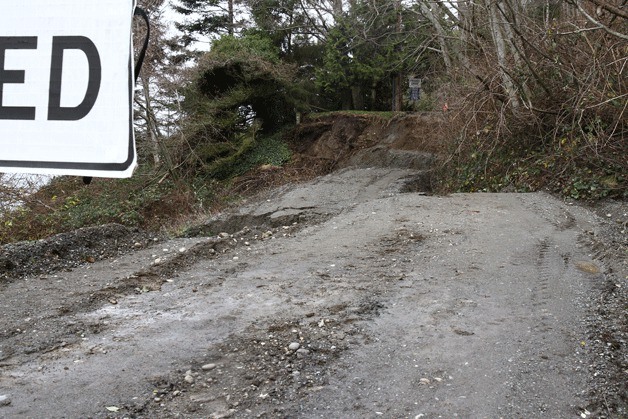A short stretch of Driftwood Way, south of Coupeville, on Monday night broke apart and slid about eight feet downhill, isolating four houses at the northern end of the street.
A few trees also slid, and on Tuesday their branches were entangled with Puget Sound Energy power lines leading to the houses.
A crew from Asplundh Tree Expert Co., which contracts with Puget Sound Energy to provide maintenance, was on hand to trim the branches.
The houses themselves showed no signs of settling or sliding, said Bill Oakes, the county’s emergency management director.
The 35-foot length of single-lane dirt road, about a quarter-mile shy of Driftwood Way’s northern end, had settled a few inches last week, but a simple grading resolved the problem, said Ryan Neighbors, a county operator who was at the scene.
Then, Monday night, “it dropped seven to eight feet,” Oakes said. “We stopped the grading, because it was too dangerous. This is a deep earth movement, not just a surface sloughing.”
The road can’t be driven on, but it can be walked, and residents are compelled to park on the south side of the slide and then walk a short distance to their homes. Two of the four houses isolated by the slide are occupied only in the summers, but the others are occupied more or less year-round, said Carolyn Brettmann, one of the year-round residents.
“This is the most severe slide we’ve had, but we’ve had smaller ones three or four times since we built this house 13 years ago,” Brettmann said. Oakes contested that, saying the road had slid more severely in 2007 or 2008.
Brettman’s husband, Ken, must drive into Seattle twice a month for cancer treatments, she said, which requires him to scramble up and down a steep, crumbly incline on the way to and from his car.
The county on Tuesday declared an emergency resolution because of the slide, allowing urgent expenditures that otherwise would require authorization. Those included offering temporary shelter elsewhere to the Brettmanns, which Oakes said they declined. The couple couldn’t be reached to comment later Tuesday.
The road could be restored within a week after the ground stops sliding, Oakes said.
Brettmann said she and her neighbors have “fought tooth and nail for years” with the county over its obligation to properly maintain the road. “It could be permanently fixed, but they obviously don’t want to pay any money to do that,” she said.
Oakes disputed that assertion.
“There is no permanent fix that our geotechs (consulting geotechnical engineers) think is workable and that is not on private property,” he said. One possible solution, horizontal drains, might interfere with the homes’ drinking water, don’t necessarily work well and would impinge on private property, he said.
In any case, he said, the entire neighborhood below the crest of the bluff is unstable. So “where do you stop stabilizing it? Is it the county’s responsibility to stabilize the unstable shorelines of Island County? I don’t think we’re there.”
This month is the sixth wettest December recorded at Sea-Tac Airport since the National Weather Service began keeping records, in 1891, said Art Gaebel, a meteorologist with that agency.
As of Dec. 22, just over 10 inches of rain had been recorded, he said. More rain increases the likelihood of slides.
A huge slide to the south of this one severely damaged one house and affected more than 30 others in March 2013. Several residents filed two negligence lawsuits against the county in April of this year.




